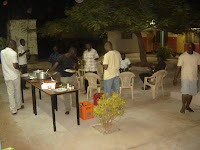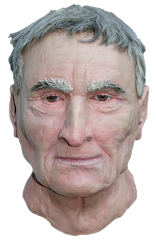
We were told there was going to be change at our school, that we would do maths and geography in Afrikaans. We were surprised, and the teachers weren't pleased about it. That winter in 1976 we thought, let's see what the first term is like. We did the first term tests, and they were disastrous.
The African National Congress and Pan- Africanist Congress were banned at the time but sometimes we would discuss the issue together and eventually they told us there would be a demonstration on June 16. Obviously everyone was thrilled.
The night before, we were so anxious, trying to come up with some banners that would have a big impact. We didn't have many, though "to hell with Afrikaans" was one example. We didn't want to tell our parents.
The day itself started normally, there was no sign of anything. Every day there would be an assembly, and we would be there singing and praying. While we were praying I saw students from Morris Isaacson high school.
I was excited but because we were praying I had to restrain myself. They were singing and chanting, they put us in the mood. Soon we threw our books down and got out our placards. Everyone was waving and singing in the streets of Soweto.
Our leader told us that the police were around the school and emphasised that we weren't to provoke them, otherwise the mission would not be fulfilled. As I was having a discussion with my friends, "bang", there was a shot. We had never thought there would be violence and we ran amok in confusion, hiding ourselves in nearby houses. Later on, when it was calm, we sneaked out again. It was like hide and seek - as soon as we heard shots, we'd hide and then when it calmed down, we came out.
I told my brother to stay next to me while I figured out how we could get home. While I was talking to him there was another shot. We ran back into hiding. When I emerged, Hector wasn't there. I said to myself maybe, because he is young, he is still hiding. The best thing to do, I thought, was to wait there, where I was talking to him, so that when he emerges, he will find me. Meanwhile, students were gathering at a scene. I wanted to go and see but couldn't because I was still waiting for Hector. But when I looked closer, I saw him there with the crowd, as if he was fetching something from them, because he was very tall. I was anxious. I could see the body frame and then I saw blood coming from his mouth. I tried to let them know that this was my brother: I have been waiting for him, can't you see he is hurt? We ran to the clinic, but we could see he was finished.
There and then I understood he was dead.
I tell myself now that I have forgiven but I won't forget.

It's a part of me I cannot run away from, but I want to move forward in life. I always say those who died did not die in vain. Obviously there are going to be a few hiccups before we get there, but we are now in a process and I am hoping for the best.
(Antoinette Sithole – Sister of Hector Pieterson. Sithole,then 17,is the schoolgirl in the picture running alongside Mbuyisa Makhubo who is carrying the dying Hector, aged 12, in his arms)
 The First Professions of our 12 novices will be on the 27th of November at the local Parish Church.
The First Professions of our 12 novices will be on the 27th of November at the local Parish Church.










 Let the games begin!!!! One month of football fever!!!!
Let the games begin!!!! One month of football fever!!!!















































